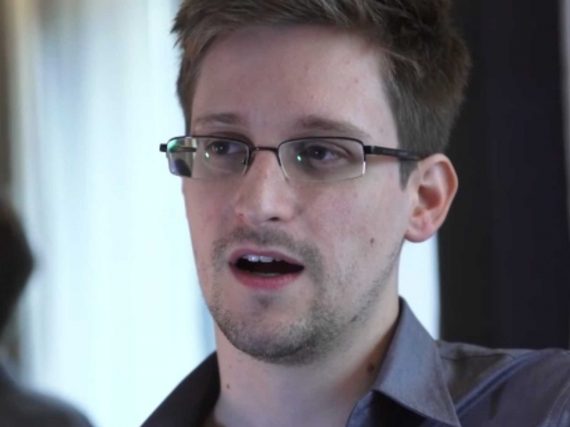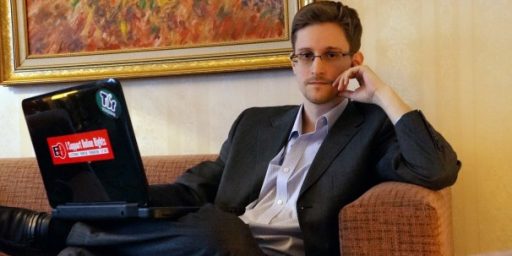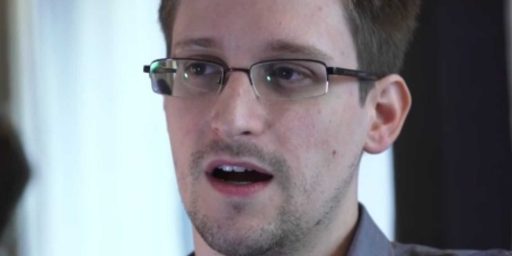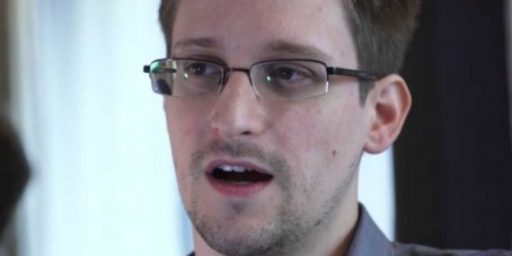Edward Snowden Did Not Commit Treason
Edward Snowden has likely violated many laws, but, absent additional facts, treason is not one of them.
In the weeks since The Guardian began publishing details of the National Security Agency’s surveillance programs from a source later revealed to be former NSA contractor Edward Snowden, there have been many calls for his prosecution. To date, no charges have been filed against Snowden that we know of (it’s possible that there may be a sealed indictment that has yet to be revealed), but already politicians have weighed in regarding what they think about the matter. Both House Speaker John Boehner and Senate Intelligence Committee Chairperson Dianne Feinstein have declared Snowden guilty of treason, and that term has been picked up by many in the media and pundit world to describe Snowden’s activities. Treason is a serious charge, of course. It is the only crime specifically defined in the Constitution, and it carries the possibility of a death sentence. At the same time, though, actual charges of treason have been relatively rare in recent years. According to this list, there have only been fourteen convictions for treason in the history of the United States, with the last being in 1952 when Tomoya Kawakita, a Japanese born American citizen was convicted on charges of torturing American POW’s during World War II. Contrary to popular belief, Julius and Ethel Rosenberg were convicted of violations of the Espionage Act, not treason, for which they were later executed. Additionally, none of the Americans caught spying for the Soviet Union or other nations during the Cold War were convicted of treason.
As Seth Lipsky explains in a recent Wall Street Journal piece, Snowden will also avoid an indictment for treason simply because what he is accused of does not meet the elements of the crime:
“Treason against the United States,” the Constitution says, “shall consist only in levying War against them, or in adhering to their Enemies, giving them Aid and Comfort.” It adds: “No Person shall be convicted of Treason unless on the Testimony of two Witnesses to the same overt Act, or on Confession in open Court.”
What this adds up to is that a person has to do one of two things to be a traitor: either levy war or adhere to (form an attachment to, the Supreme Court once said) our enemies, giving them not only aid but also comfort. The two-witness rule has also made treason cases rare in American history.
The liberalism inherent in the Founders’ formulation is one of America’s glories. It means that we Americans can criticize our government during war and even praise an enemy government without being a traitor. Talk doesn’t rise to the level of treason unless one also adheres to the enemy. But if one does adhere, even in passing, watch out.
(…)
War has actually to be levied before there can be treason. This was laid down in a Supreme Court ruling in 1807, in a case involving two confederates of Aaron Burr, Erick Bollman and Samuel Swartwout. They’d been put in the dock for treason, accused of having plotted with the former vice president to break off part of America as a separate country.
Chief Justice John Marshall let them go. “To conspire to levy war, and actually to levy war, are distinct offenses,” he wrote in a famous opinion known as Ex Parte Bollman. “The first must be brought into operation by the assemblage of men for a purpose treasonable in itself or the fact of levying war cannot have been committed.” He marked that the “actual enlistment of men to serve against the government does not amount to levying war.”
Then, however, he issued a famous warning.
“It is not,” Marshall wrote, “the intention of the Court to say that no individual can be guilty of this crime who has not appeared in arms against his county. On the contrary, if war be actually levied—that is if a body of men be actually assembled for the purpose of effecting by force a treasonable purpose—all those who perform any part, however minute or however remote from the scene of action, and who are actually leagued in the general conspiracy, are to be considered as traitors.”
Notwithstanding Chief Justice Marshall’s warning, and the fact that it arguably be used to apply to the “war on terror” even though there has been no formal declaration of war, from what we know about what he did it seems extremely unlikely that Snowden’s actions fall within the legal definition of treason. For one thing, it’s utterly clear that he neither “levyed war” nor adhered to an enemy of the United States. If that “enemy” is described as al Qaeda, then it’s hard to make the case that anything he did constituted levying war or adhering to an enemy of the United States. Snowden, at most, has made public a series of classified documents revealing the nature and extent of the National Security Agency’s data mining of telephone records, the Internet, and credit card transactions as well as information with how the NSA and other Federal agencies interact with the secret court authorized by the Foreign Intelligence Surveillance Act. That may, and likely does, constitute violations of the Espionage Act and other statutes, but it’s not treason. Even if prosecutors were somehow able to meet this first part of the definition of treason, it would seem to be next to impossible for prosecutors to establish the remainder of the legal requirements of the Constitution definitions, not to mention the fact it’s highly likely that there are not two witnesses to the same overt act.
What if, as some have suggested without evidence, Snowden is cooperating in some way with the Chinese by giving them information about how the United States is gaining access to Chinese computer systems and otherwise spying on them? In this case, Snowden would fall into the same category as the Rosenbergs. At the time they committed the acts which led to their convictions, which essentially involved stealing secrets related to the Manhattan Project and passing them to the Soviets, we were still in the middle of World War II and the Soviet Union was an ally, not an enemy. Therefore, just as with the Rosenbergs, Snowden would potentially be subject to charges under the Espionage Act, but not Treason. In Snowden’s case, while China may be characterized as an actual or potential adversary, it would be incorrect to call that nation an “enemy” as the definition of treason clearly intends the term.
Of course, when most people use the word “treason” with respect to someone like Snowden, they likely aren’t thinking of the legal definition, but of the general subject of someone who has betrayed their country in some way or another. In that situation, it becomes more of a social judgment than a legal conclusion. Nonetheless, Lipsky points out, there’s a very good reason why the Founders placed the definition of treason in the Constitution where it would be relatively safe from being manipulated by the legislature:
This is a teachable moment in respect of a heinous crime. It reminds us of why the Founders made it so difficult to bring charges of treason. But it’s also a moment to reflect on a warning sounded by an early chief justice. The constitutional protections against abuses of treason charges remain strong, but once war is levied—that is, waged—citizens will want to take care about how they behave.
For treason turns out to be unique in American law. It is the only crime that the Constitution forbids Congress from defining. It is the only crime to which a court may never accept a confession given to the police. It is the only crime for which restrictions are laid down on how much evidence juries must hear. The Constitution itself underscores that the Founders feared treason law.
No doubt, Snowden will be indicted for something in the near future if that hasn’t already happened. The offenses will likely be serious enough that he could face a life sentence in prison if not the death penalty itself. If the U.S. manages to extradite him, he will stand trial for those charges, but unless there is far, far more that hasn’t been revealed yet, he will not be charged with treason because the facts to support such a charges simply don’t exist. So, while it’s okay I suppose to call Snowden a “traitor” as a means of expressing social approbation, it’s important to remember that the actual crime of treason is hard to prove for a very good reason.





In the narrowest legal sense of the term you are right. But he has betrayed his country and his oath.
@Amos Jones: That’s one interpretation. Another is Snowden is helping his country and betraying the state. Those two things are not synonyms.
Treason? Right now I have a hard time with that notion. If his actions are treason then many important newspapers of record are also guilty of treason. Snowden is getting a lot publicity for telling the public about a program (NSA data mining of hundreds of millions of telephone and email records) that we’ve known of (it was widely reported in many newspapers) since 2006.
@Amos Jones:
I keep hearing this, but I still don’t get what oath everyone is saying he betrayed.
The oath he took was to the constitution. You do not take an oath to secrecy when you get security clearance. It is simply a contract, and agreement. The only oath you swear is to protect and defend the constitution, which he has done to his great personal danger. And I will eternally thank him for that.
I agree that he hasn’t committed treason, but his disclosures on NSA surveillance of foreign diplomatic communications certainly push up to the line.
@stonetools:
How does that come anywhere near the line? None of those countries are our enemies. Neither did he levy war nor did he attach himself in any way to one of our enemies. The elements of the crime are completely missing.
@stonetools:
Do they? Are they more serious than what the Rosenberg’s did? And, remember they weren’t charged with treason because they weren’t legally eligible.
So far the only ones that seem to be squawking the loudest about Snowden and the NSA leaks, are the Big Government types. I haven’t seen any member of the citizenry being very critical about this, From what I have been seeing, most of the ordinary people have been very supportive towards Snowden. Although this could change if more info is released.
@Doug Mataconis:
His offenses are less than what the Rosenberg’s did and I agree that his disclosures aren’t treason. I think you can see the treason line from there, though. If he discloses NSA secrets to China, for example, then we can argue treason. He hasn’t done that-yet. Let’s hope we never have that discussion.
@Stan25:
Then you’re hanging around with a very limited group of friends. I think on the contrary that most people have contempt for Mr. Snowden. I do.
@Stan25:
I’d say most of the citizenry doesn’t give a damn, one way or the other-which is why I believe-contrary to the civil libertarians-that this issue is going to fade away soon.
Any time the Snowden disclosures are discussed I see arguments about how awful the National Security Agency is and why its program of snooping should be ended immediately. This raises the question of how the government should protect us against terrorist attacks. Should it expect Al-Qaeda terrorists to repent out of remorse and call a local FBI office to confess? Should it provide a detailed explanation of how it conducts its surveillance, so that all of us, including would be Tsarnaev imitators, learn how to keep our secrets effectively? Or should it mollify Al-Qaeda by supporting its goals, including such gems as returning Spain to Moslem rule?
My answers are no, no, and no. And no, I don’t think Snowden is guilty of treason, but I do think he’s a fool.
Stop. They’re using “treason” in its colloquial sense, not its strict legal meaning. Treason (the offense) is very hard to prove for obvious reasons. But he’s violated several other statutes on multiple counts, including this one: http://www.law.cornell.edu/uscode/text/18/798.
Someone asked what oath. The oath is the one that a federal employee or contractor must sign when entrusted with classified information.
A recent precedent. http://www.justice.gov/opa/pr/2011/January/11-crm-015.html
The elephant in the room is that you can avoid NSA surveillance if you uses a webmail that´s not based in the US and if you uses a VPN. On the other hand, at least since the Petraeus affair any minimally competent terrorist should have noted that communicating using Gmail was a bad idea.
If John Walker Lindh wasn’t tried for treason, I find it hard to believe that Snowden would be even in the ballpark.
Treason? It’s still in doubt whether Snowden can be convicted of having committed any serious felony, much less treason.
http://www.salon.com/2013/06/11/put_the_nsa_on_trial/
@Butch Bracknell:
There is no “oath” that any federal employee or contractor must take before being entrusted with classified information. It is simply a contract; basically an NDA. The only OATH any federal employee takes is to protect and defend the constitution. Listen to this guy, he was in the CIA, and he says the same thing
@michael reynolds: Multiple polls indicate the citizenry is pretty evenly split, some indicate a slight majority believe he should be brought back and tried, some show a slight majority believing his actions help the country.
The problem might be that your friends are partisan Democrats, who have completely flipped on the issue of domestic surveillance since the Bush Administration. Republicans have largely flipped the other way.
Good item.
However just because someone was in the CIA means that they should be assigned credibility is no way to go.
See: G. Gordon Liddy
@Ben Wolf:
Wow, a mirror image of me. I go back and forth on this one but always hanging around the 50/50 mark. First off, of everything that has been revealed so far, none of it was surprising to me. I had always assumed that these things were happening to some extent at least. What is the right amount is the question and to the extent that he has brought this discussion into the public square, I tip my hat to him. But the other shoe has yet to drop. Perhaps there is no other shoe. Maybe Greenwald is engaging in blatant hyperbole. Time will tell.
But please, whatever else he is, he is no hero. I read a Guardian headline underneath his picture that said, “This country is worth Dying for”. Right. That is why he is hiding in Hong Kong or wherever now, because he is so willing to die for his country.
And for the record, if I had done what he did (not at all sure that I would), I would probably be hiding out in some 3rd world country too. But I would not be talking of my willingness to die for my country when my actions speak so plainly to the opposite.
@Ben Wolf: Which country is Snowden’s, America or Communist China? We need to clear that up first before we decide whether he’s helping.
He obviously hasn’t committed treason in the legal sense, and I don’t feel he has in a colloquial sense, at least not as far as we know. His fleeing to Hong Kong (i. e. China) is suspicious, but there’s no evidence he’s turned over any information to anyone besides Greenwald and The Guardian.
The more I read about him, the more certain I am of a couple things.
One, that he intended from the beginning of his employment at BAH, if not before, to steal information on these programs and run away with it.
Two, that he was not actually read on to the details of the programs–as a sysadmin, he’d have had no need to know. (He had a TS/SCI clearance, but pretty much any NSA contractor does, because they work in spaces where that information is processed and might inadvertently see it, and it’s a lot easier to deal with if they are already cleared.)
So basically he knew of the programs, perhaps had a high-level briefing, but didn’t know the nuts-and-bolts aside from whatever he was able to glean from the information he stole.
Snowden is clearly someone who believes the government should not engage in surveillance AT ALL and he has extended his policy disagreement into a huge compromise of classified information.
And he’s a huge narcissist who is getting a big ego feed out of all the adoration he’s receiving from millions of people who couldn’t tell you what Maryland v. Smith is to save their lives.
To paraphrase The Dude: “You’re not a traitor, Edward. You’re just an asshole.”
I feel compelled to point out that Ego != Security. In other words, making the US (or the NSA, or the President) look foolish is not, and should never be, treasonous. Or, IMNSHO, even a crime.
Likewise, if the NSA is actually breaking the law by engaging in these activities, it should not be a crime in itself to bring that to light. If obeying the law makes the NSA’s job harder, then boo-f*ckin’-hoo.
The question is whether he really believed he was being a whistleblower or whether he had other motives.
All a bunch of hoo-ey as far as I can see.
And Greenwald was crowing about further earth-shattering disclosures…
So far…bubkis.
He may not have committed treason as some say but he did a dis-service to the country and for that he should be ashamed! The fact he left the country after his big BRAVE outing of information, this COWARD left the country he is supposed to LOVE so much. With true patriots like him, who needs enemies? Sarcasm intended here!
@Ben Wolf:
I wasn’t particularly exercised over the NSA stuff when it was under Mr. Bush and remain un-moved today.
First, this isn’t news to me. I’ve been debating this for the last two years off and on with my son who actually pointed out to me the location in SF where the NSA is known to tap an AT&T facility. Beyond that, I’m not shocked, shocked to discover that we have an intelligence system that is very good at SIGINT (Signals Intelligence.)
Second, I want this done because I’m a civil libertarian. Because I know how many microseconds our notions of civil liberties would last if this country began experiencing terrorism on a regular basis. Pearl Harbor had us rounding up American citizens and throwing them into camps. The civil liberties damage done by 9-11 could have been much worse, and would be much worse if those kinds of events recurred. As it is we managed to launch two complete, decade-long wars. All off a single terror attack.
I think an awful lot of the love for Snowden is from 60’s nostalgia and from the paranoid fringe in society. And I think there’s a lot of self-aggrandizing, low-risk chest thumping about how unafraid we should all be of terrorism because statistically blah blah blah. Like people would be checking statistics if we had another 9-11 or worse.
People need to exercise their imaginations a bit and think about what life would be like in this country if we had another 9-11, or a series of smaller suicide bombs in busy shopping malls. This is hardly the worst imposition on civil liberties we could manage. We could have roadblocks and papers checks and preventive detention if people get worried enough. We could close the borders. We could limit internet access. We could really take the gloves off the NSA. We are capable of genuine paranoia and overreaction in this country. This ounce of prevention is preferable to the alternative, particularly given that no one has yet shown me a case of actual harm, or a realistic scenario for actual harm to actual people from PRISM.
Really? In the queue? Why?
Help?
So I have been listed in the local land line phone company directory, name, address and phone number since 1968.
Still am.
I guess the listing is still provided by the phone company Directory Assistance service since I do not pay the extra monthly charge for an Unlisted Number.
What degree of “expectation of privacy” should I hope for?
Watch we see is the phenomenon of the Incredible Shrinking Snowden. When the revelations began, Snowden was heralded as a civil liberties hero and we were promised STARTLING! NEW! revelations showing that the NSA was routinely listening to phone calls and reading the emails of US citizens on a massive scale. Now that these revelations have been walked back, what we have heard is what has been reported since 2006.
People spoke hopefully about having a “debate” about surveillance-as if Congress hasn’t debated these programs several times. So far the general public seems just fine with the NSA data mining phone logs. If there is a need for anything, then there is a need for tweaking the laws to make things more transparent-but frankly, I see no big public demand for even that.
I note that none of the Snowden supporters seem interested in arguing Snowden’s thesis-which is that all mass surveillance of the public and of foreigners should stop . Presumably, they concede that we should have an NSA after all, despite their concerns.
Meanwhile, the defense of Snowden has dwindled to-at least he isn’t guilty of treason. Well, OK.
Welllll here’s an interesting little wrinkle. Yeah – the NSA doesn’t record American’s phone conversations. But the British do, and they hand the data over to the NSA, who then go over it with their sweaty little palms, secure in the legal loophole that they didn’t do the actual collection. Pigfuckers.
@stonetools:
South China Morning Post: Edward Snowden – Classified US data shows Hong Kong hacking targets
@stonetools:
This is a straw man. No one has ever argued we shouldn’t have an NSA. Snowden himself hasn’t even made this argument. Most people are simply saying the NSA has way overreached and that there should be meaningful oversight of the NSA.
@michael reynolds: How do you know that most people “have contempt for Snowden”? Did you contact most people and ask them?
If Snowden is a traitor according to our government, then the enemy is the people of the United States. The government is against the people. They want us chained and afraid. This is shameful. Notice how they assume we’re all guilty unless we have”friends” in Washington.